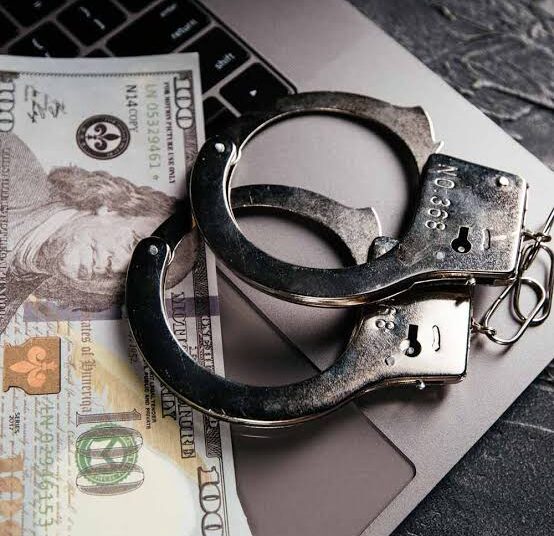Paper presented by ACE1 Aso Larrys Peters, at workshop on Economic and Financial Crimes Reporting organized by EFCC in Ibadan.
UNDERSTANDING THE NEW MONEY LAUNDERING LAWS IN RELATION TO THE ACTIVITIES OF DESIGNATED NON-FINANCIAL BUSINESSES AND PROFESSIONS.
1.0 INTRODUCTION
The past administration of President Muhammadu Buhari in a bid to provide an effective and comprehensive legal and institutional framework for the prevention, prohibition, detection, prosecution and punishment of money laundering and other related offences in Nigeria and to further guarantee compliance with international anti-money laundering instruments, best practices and standards spearheaded by the Financial Action Task Force(FATF) signed into law on 12th May, 2022, the Money Laundering (Prevention and Prohibition) Act (the MLPPA,2022).
In order to comprehend the subject matter, it is imperative to define the central phrase “Money Laundering” and outline its components/key features in order to establish a solid definitive foundation for subsequent discussions. Consequently the question that must be addressed is:
What is Money Laundering?
Money Laundering simply means the process of making illegally earned money appear to be “clean’. This is the process whereby money acquired from illegal activities is given the appearance of having been obtained by legitimate means. The Central Bank of Nigeria (CBN) Anti Money Laundering/Combating the Finance of Terrorism (AML/CFT) Policy and Procedure Manual 2018 defines money laundering as “the act of directly or indirectly concealing or disguising any fund or property that is derived from the proceeds of an unlawful activity.” It is the process by which ill-gotten wealth is made to look legitimate.
Money Laundering typically takes three stages:
Placement: this refers to putting the illegitimately earned money into a legitimate stream of commerce
Layering: this entails placing the money continuously, in smaller chunks, through multiple legal transactions to make its origin harder to trace
Integration: this denotes returning the money into the hands of the owner so it can be spent without drawing suspicion from the authorities
Each of the aforementioned stages requires the establishment of legitimate business and cover-up transactions to make it more difficult for an investigator to discover the real source of the money.
Money laundering is a crime in most countries of the world, it’s an international crime that the offender can be arrested and tried in any country where he committed the offense. It is also a high class offense in Nigeria and the Money Laundering (Prohibition) Act, 2022 is the main law that regulate and provide for the offense of and punishments for the crime of money laundering in Nigeria and the Economic and Financial Crimes Commission is the law enforcement agency charged with the statutory duties of arresting and prosecuting money launderers.
The MLPPA, 2022 repealed the Money Laundering (Prohibition) Act, No. 11, 2011 to provide a more effective and comprehensive legal and institutional framework, for the prevention, prohibition, detection, prosecution and punishment of money laundering and other related offences in Nigeria. The Act in Section 17 also established the Special Control Unit Against Money Laundering (SCUML) which is domiciled with the Economic and Financial Crimes Commission with a mandate to amongst other things: register, certify, monitor, and supervise, necessary enforcement actions to ensure compliance and conduct off-site, on-site, and on the spot checks, inspection of Designated Non-Financial Businesses and Professions (DNFBPs) for money laundering control and supervision under the Act, relevant laws and applicable regulations.
Section 18 (2), sub section (1) of the Money Laundering (Prevention and Prohibition) Act 2022, provides a technical definition of Money Laundering and prohibits Money Laundering in Nigeria. Section 18(2) provides that any person or body corporate, in or outside Nigeria, who directly or indirectly:
(a) Conceals or disguises the origin of,
(b) Converts or transfers,
(c) Removes from the jurisdiction, or
(d) Acquires, uses, retains or takes possession or control of any fund or property, intentionally, knowingly or reasonably ought to have known that such fund or property is, or forms part of the proceeds of an unlawful act, commits an offence of money laundering under this Act.
2.0 DESIGNATED NON FINANCIAL BUSINESSES AND PROFESSIONS (DNFBPs)
The Money Laundering (Prevention and Prohibition) Act, 2022 in Section 30 interpreted the phrase “Designated Non-Financial Businesses and Professions” by enumerating the various businesses and professions that fall within the provision, which include legal practitioners and notaries.
“Designated Non-Financial Businesses and Professions” (DNFBPs) has the same meaning as “Designated Non-Financial Institutions” (DNFIs) which was used in the repealed Money Laundering Act, 2011 however, the MLPPA, 2022 interpretation is more elaborate as it includes additional businesses and professions. DNFBPs under the new Act are defined to include licensed legal practitioners and notaries. The MLPPA 2022 therefore cures the lacunae that was created by the decisions of the Court in the case of Central Bank of Nigeria v. Registered Trustees of the Nigerian Bar Association unreported-Appeal No:CA/ABJ/202/2015 delivered on 14th June 2017 and Federal Republic of Nigeria v. Chief Mike Ozekhome (SAN)(2021) LPELR-54666 (CA) to the effect that legal practice and legal practitioners did not fall within the contemplation of DNFIs under the MLA 2011.
2.1 UNLAWFUL ACTIVITIES PROCEEDS OF WHICH MAY BECOME THE SUBJECT OF ANY OF THE MONEY LAUNDERING OFFENCES CREATED UNDER THE ACT
The new Act highlights a number of activities which will be considered to constitute the offence of Money Laundering and will attract investigation and consequent prosecution by the authorities. These activities include the following:
Participation in an organized criminal group;
Racketeering, terrorism, terrorist financing;
Trafficking in persons, smuggling of migrants, sexual exploitation, sexual exploitation of children;
Illicit trafficking in narcotic drugs and psychotropic substances;
Illicit arms trafficking, illicit trafficking in stolen goods;
Corruption, bribery, fraud, currency counterfeiting;
Counterfeiting and piracy of products, environmental crimes;
Murder, grievous bodily injury;
Kidnapping, hostage taking, robbery or theft;
Smuggling (including in relation to customs and excise duties and taxes), tax crimes (related to direct taxes and indirect taxes);
Extortion, forgery, piracy;
Insider trading and market manipulation; and
Any other criminal act specified in this Act or any other law in Nigeria including any act, wherever committed in so far as such act would be an unlawful act if committed in Nigeria.
2.2 KEY INNOVATIONS OF THE MONEY LAUNDERING (PREVENTION AND PROHIBITION) ACT 2022
The noteworthy innovations of the new Act include:
Limitation to make or accept cash payment (Section 2.)
The Act prohibits individual and corporate bodies, except in a transaction through a financial institution, from making or accepting cash payment exceeding the sum of N5,000,000.00 or its equivalent and N10, 000,000.00 or its equivalent, respectively.
Sec. 2 (2) states that a person shall not conduct two or more transactions separately, with one or more financial institutions or designated non-financial businesses and professions, with intent to:
(a) Avoid the duty to report a transaction which should be reported under this Act; and
(b) Breach the duty to disclose information under this act by any other means.
2. Identification of customers (Section 4.)
Sec. 4(1) states that a financial institution and a designated non-financial business and profession shall:
(a) Identify a customer, whether permanent or occasional, natural or legal person or any other form of legal arrangements, using identification documents as may be prescribed in any relevant regulation;
b) Verify the identity of that customer using reliable, independent source documents, data or information;
(c) Identify the beneficial owner using relevant information or data obtained from a reliable source such that the financial institution or the designated non- financial business and profession is satisfied that it knows who the beneficial owner is; and
(d) Take reasonable measures to verify that any person purporting to act on behalf of the customer is so authorized, identified and verify the identity of that person.
3. Restriction on Lawyer-Client Confidentiality Privilege (Section 11)
It is the provision of Rule 19 of the Rules of Professional Conduct for Legal Practitioners, 2007, that all oral or written communications made by a client to his lawyer in the normal course of professional employment are privileged and that such communications cannot be disclosed by the lawyer except with the consent of his clients or as may be permitted by law.
Sec. 11 (4) of the new Act provides that Legal professional privilege and the invocation of client confidentiality shall not apply in connection with the following:
(a) The purchase or sale of property;
(b) The purchase or sale of any business;
(c) The managing of client money, securities or other assets;
(d) The opening or management of bank, savings or securities accounts;
(e) The creation, operation or management of trusts, companies or similar structures; or
(f) Anything produced in furtherance of any unlawful act
4. Prohibition of numbered or anonymous accounts, accounts in fictitious names and shell banks. (Section 12)
Sec. 12 states in the subsections below as follows:
(1) That the opening or maintaining of numbered or anonymous accounts by any person, financial institution or body corporate is prohibited.
(2) A person shall not establish or operate a shell bank in Nigeria.
(3) A financial institution shall:
(a) Not enter into or continue correspondent banking relationships with shell banks; and
(b) Satisfy itself that a respondent financial institution in a foreign country does not permit its accounts to be used by shell banks.
5. Power to demand and obtain records (section 24)
Section 24 provides that, a competent authority may demand, obtain and inspect the books and records of a financial institution or designated non-financial institution business and profession to confirm compliance with the provisions of this Act.
Section 30 provides “competent authority” means any agency or institution concerned with combating money laundering and terrorist financing under this Act or under any other law or regulation;
6. Periodic furnishing of reports on money laundering (Section 26)
The Act introduced the periodic furnishing of reports on money laundering by the Attorney General of the Federation within two years of its passage into Law and every two years thereafter.
Section 26(1) states that within two years of the coming into force of this Act and every two years after that, the Attorney-General of the Federation SHALL cause to be prepared, for submission to the President, a Nigerian Money Laundering Strategy Report (in this section referred to as “the Report”) which shall contain contributions from all competent authorities.
7. Administrative penalties (Section 27)
Section 27 states as follows:
(1) Supervisory and regulatory authorities may impose on:
(a) A financial institution;
(b) Designated non-financial business and profession; or
(c) any officer of a financial institution or designated non-financial business and profession, for any breach of any requirement of this Act, such administrative sanctions as may be prescribed in a regulation made by the Attorney-General of the Federation under this Act.
(2) Any penalty imposed by a supervisory or regulatory authority by virtue of subsection (1) shall take precedence over and is not limited by any other sanction that may be imposed under any other regulation.
3.0 THE DUTIES AND RESPONSIBILITIES OF INDIVIDUALS AND CORPORATE ORGANIZATIONS
The new MLA places and in some cases reiterates certain obligations on individuals and corporations. These obligations include:
Identification of customers: Financial Institutions and Designated Non-Financial Business and Professions are required to identify their customers, and persons purporting to act on behalf of their customers. FIs and DNFBPs are also expected to undertake customer due diligence measures when establishing business relationships and carrying out transactions that involve wire transfers or where there is a suspicion of money laundering.
Preservation of Records by Relevant Authorities
The Act imposes an obligation on the relevant institutions to preserve and keep at the disposal of any competent authority and such other regulatory authorities or judicial persons as the Unit may specify by order published in the Federal Government gazette, the following records:
All necessary records on transactions, both domestic and international, for at least five years following completion of the transaction; and
All records obtained under section 4 of the Act, including account files and business correspondence, and results of any analysis undertaken, for at least five years following the termination of the business relationship or after the date of the occasional transaction.
These records shall be sufficient to permit individual transactions to be readily reconstructed at any time by the competent authorities and be made available to them swiftly.
Internal Procedures, Policies and Control Measures by Relevant Institutions to Combat Money Laundering
The Act requires that the relevant institutions develop and put in place necessary programs to combat the laundering of the proceeds of a crime or other unlawful acts, and they shall include:
The designation of compliance officers at management level at its headquarters and at every branch and local offices;
The regular training programs for its employees;
The centralization of the information collected; and
The establishment of an internal audit unit to ensure compliance with and effectiveness of the measures taken to enforce the provisions of the Act.
Failure to comply with the above provisions, the Central Bank of Nigeria (CBN), Securities and Exchange Commission (SEC), National Insurance Commission (NAICOM) and the Unit may impose a penalty not more than N1, 000, 000.00 for designated non-financial businesses and professions, not less than N1, 000, 000.00 for capital brokerage and other financial institutions and N5, 000 ,000.00 in the case of a bank. These authorities may in addition to the above penalty suspend the licenses of any of the relevant institutions that fail to comply with this obligation.
Duty to report international transfer or transportation of funds, securities and cash: Transfer(s) of funds or securities to or from foreign countries by individuals or corporates exceeding US$10,000 or its equivalent are to be reported to the Nigerian Financial Intelligent Unit (“NFIU”), the Central Bank of Nigeria and/or the Securities and Exchange Commission (as the case may be) in writing within one day from the date of the transaction. Transportation of cash or negotiable instruments in excess of US$10,000 or its equivalent by individuals in or out of Nigeria are also required to be declared to the Nigerian Customs Service.
Duty to report suspicious transactions: Financial Institutions and Designated Non-Financial Business and Professions are obligated to report any suspicious transaction within twenty-four (24) hours after such transaction and submit a detailed report of such suspicious transaction. Suspicious transactions according to the Act include transactions that are unjustifiably and unreasonably frequent or which in the opinion of the FI or DNFBP involve the proceeds of a criminal activity, unlawful act, money-laundering, or terrorist financing.
Powers to stop transactions/block funds:
The Act empowers competent authorities under an order of the Federal High Court obtained upon an ex-parte application supported by a sworn declaration by an officer of the competent authority justifying requests to identify and locate the proceeds, properties, objects, or other things relating to the commission of an offence: Place any bank account or any other account comparable to a bank account under surveillance;
NFIU or the Economic and Financial Crimes Commission (EFCC) may place a stop order of seventy-two (72) hours on an account or transaction, if it is discovered to be involved in any unlawful act. Transactions or funds may be blocked in instances where it is not possible to ascertain the origin of the funds.
Virtual Assets: Virtual asset service providers are regarded as FI’s by the Act. Interestingly, the Act also recognizes virtual assets as a medium of exchange and provides that virtual assets include any digital representation of value that can be used for payment or investment purposes.
Enhanced due diligence for politically exposed persons: Financial Institutions and DNFBPs are obligated to conduct enhanced due diligence and take reasonable measures to establish the source of wealth and source of funds of customers who fall within this category while establishing business relationships.
Mandatory Disclosure by Legal Practitioners: The Act categorizes the legal profession as a DNFBP and stipulates that the rule of attorney-client privilege and confidentiality will not apply to financial transactions that relate to the purchase or sale of property and or business, and the management of money, trusts and assets belonging to clients.
Power to obtain records: A competent authority, which includes the NFIU, the SCUML and other regulatory authorities as designated by the Act may demand, obtain, and inspect the books and records of an FI or DNFBP to confirm compliance with the provisions of this Act.
4.0 CONCLUSION
The Money Laundering (Prevention & Prohibition) Act 2022, is an innovative legislation, in that, it does not leave the responsibility of preventing and fighting money laundering in the hands of constituted authorities alone, rather, it shares such responsibilities with Individuals and corporate organizations by obligating individuals and corporate organizations to follow certain guidelines and observe certain procedures before consummating transactions whose proceeds may become the subject of any of the money laundering offences. These certain measures if judiciously observed by individuals and corporate organizations will not only deter the perpetrators of money laundering, but it will curb it to the barest minimum.
Individuals and corporate organizations have nothing to fear or worry about the Money Laundering (Prevention & Prohibition) Act 2022. The responsibilities and guidelines for doing business outlined in the Act are practicable and if judiciously followed, will shield individuals and corporate bodies from being victim of money laundering or being aiders and abettors of money laundering.
I enjoined you all to follow the practical steps set out in the Act and wish you success in all you endeavors.
Thank you.













